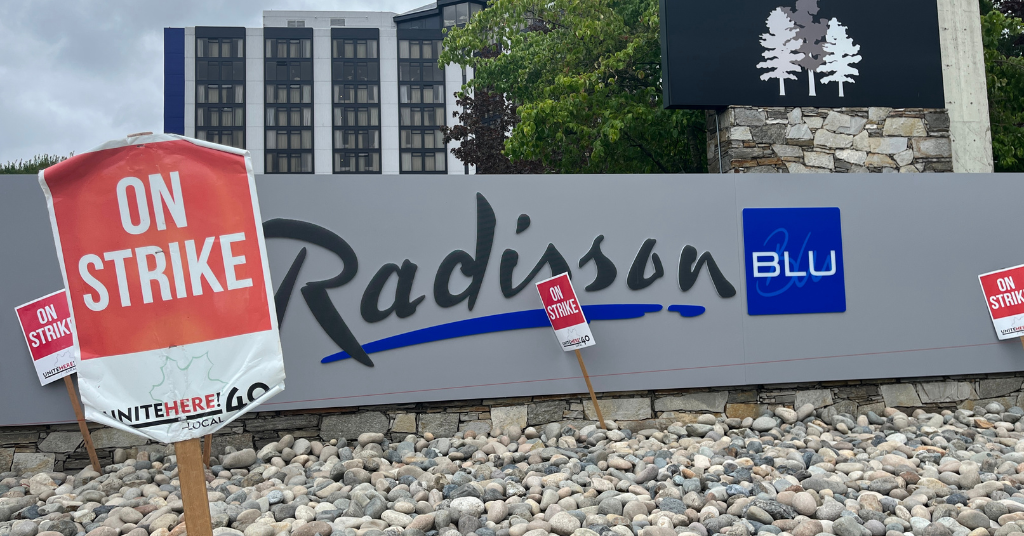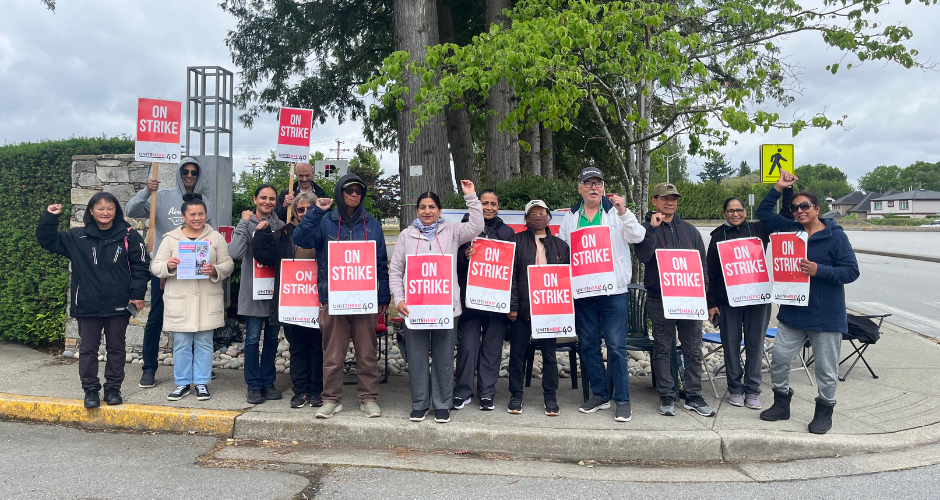
Canada’s Longest Active Strike Keeps Going at a BC Hotel. Here’s How It Gets Around an Anti-Scab Law.
New ownership, federal funding and provincial complacency compound in an unprecedented two-year dispute at a Vancouver hotel
A two-year strike by workers at a hotel near Vancouver’s airport keeps going despite legislation in British Columbia that is intended to shorten drawn-out labour disputes.
The strike is currently the longest ongoing in Canada in any industry and the longest hotel strike in BC history. Over the last decade, strikes in Canada have lasted an average of 46 days.
Hotel workers at the Radisson Blu Vancouver Airport, formerly known as the Pacific Gateway Hotel, have been on strike since May 2021, fighting for the recall rights of 143 long-term workers laid off during the COVID-19 pandemic.
Throughout the strike, the hotel has remained mostly operational, thanks to money from a quarantine contract with the federal government and shortcomings in BC’s anti-scab legislation.
TWO YEARS ON THE PICKET LINE: Workers at the Pacific Gateway Hotel (now Radisson Blu) have been on strike for two years, making it one of the longest strikes in the country and the longest hotel strike in BC #canlab #bclab pic.twitter.com/3T06MYi478
— Emma Arkell (@EmmaArkell7) May 26, 2023
Anti-scab legislation is intended to prevent employers from hiring replacement workers during a strike to strengthen workers’ bargaining power and encourage faster resolutions.
BC is one of two provinces with anti-scab laws, something unions have also been calling for at the federal level.
While BC has the strongest anti-scab laws in Canada, there are still ways for employers to get around them, according to Charles Smith, a labour historian at the University of Saskatchewan.
“A strict form of anti-scab legislation would say you can’t use replacement workers – full stop,” Smith told PressProgress. “Once that happens, there’s real economic punishment on the employer.”
BC’s anti-scab legislation doesn’t prevent managers and employees outside the striking bargaining unit from doing the tasks of striking workers. It also doesn’t prevent employers from using striking workers who cross picket lines.
An employer’s ability to maintain business operations during a strike contributes to drawn-out disputes, Smith said.
“If the employer is not being harmed economically, there’s no incentive for them to end the dispute.”
Unite Here Local 40, the union representing striking hotel workers at the Radisson Blu, has filed two complaints with the BC Labour Relations Board over alleged scabbing during events at the hotel restaurant. Both complaints were dismissed over insufficient evidence that the work completed by caterers was the exclusive work of the bargaining unit.
The strike began after 70% of the hotel’s staff were laid off during the COVID-19 pandemic and terminated permanently after the one-year recall rights entrenched in their collective agreement expired.
The remaining workers went on strike in protest of the terminations and employer attempts to roll back wages and benefits, according to Unite Here.
Among the terminated workers, 90 are women and of that group, 69% are women of colour.

Photo by Phoebe Fuller/PressProgress.
The luxury hotel remains open to the public, staffed by managers and a handful of workers who crossed the picket line, but it is unable to operate at full capacity. Before the strike, the 400-room hotel was staffed by around 200 workers.
Smith said the hotel’s actions are typical union-busting.
“That is shocking to me that someone is willing to dig in their heels to such a degree,” Smith said. “You don’t let [workers] on the picket line this long without an attempt to break the union.”
Michelle Travis, a spokesperson for Unite Here Local 40, echoed Smith’s assessment.
“This hotel was making a ton of money during the pandemic because of the government contract they had,” Travis told PressProgress. “They didn’t need to terminate the workers, but it seems like they were looking to get rid of their unionized workforce.”
The hotel was one of 38 in Canada funded by the federal government as a quarantine site during the pandemic. In January 2022, the government ended its contract over the hotel’s treatment of unionized workers.
Unite Here estimates that the hotel made as much as $33 million dollars over the 21-month contract that saw union workers replaced by contractors brought in by the Red Cross.
PHI Hotel Group, a subsidiary of the RBI Group of Companies, purchased the hotel at the end of 2019. PHI owns and operates 18 other hotels in Western Canada, none of which are unionized with Unite Here.
Sukhi Rai, president of the RBI Group of Companies, denied that the terminations were a union-busting tactic.
“That’s not possible. That has nothing to do with any of this,” Rai told PressProgress.
Rai pointed to the closure of the hotel’s restaurant, which has remained closed since March 2020, as a reason why the hotel won’t bring back terminated workers. He said the luxury hotel has no plans to reopen any of its food and beverage services.
“If I don’t have work for somebody, how could I employ them?” Rai said.
Among the 143 workers terminated were 90% of housekeeping staff.
Rai also denied Unite Here’s claim that the hotel tried to roll back wages for remaining workers.
Prior to the strike, Unite Here lobbied the hotel and provincial government to extend workers’ recall rights given the extenuating circumstances of the pandemic, but both refused.
In a September 2021 agreement with Hospitality Industrial Relations (HIR), an organization that acts as the bargaining agent for member hotels in BC, Unite Here secured extended recall rights for workers laid off during the COVID-19 pandemic and unlimited recall rights during future crises.
Despite this industry precedent, a few hotels still refused to guarantee that union workers could return to their jobs after the pandemic subsided, including the Radisson Blu.
Hotel workers are fighting for their right to be recalled to work after the pandemic ends.
Without legislation protecting their right to recall, they could lose their jobs for good.https://t.co/3PprMOIItX #canlab #bcpoli
— PressProgress (@pressprogress) June 8, 2021
According to Travis, the historically long strike could have been avoided had the provincial government issued right-to-recall legislation.
“That would have gone a long way to ensuring that workers would have had their jobs back,” Travis said. “This (strike) wouldn’t have happened had they had that kind of protection.”
The terminated workers were employed by the hotel for an average of 10 years, some over 40 years. Many are women close to retirement age who are worried about their job prospects elsewhere.
Jillian Louie, a former server at the hotel, worked there for 29 years, starting when she was only 19 years old. She’s determined to get her old job back.
“My fight will not let me give up. Even if I’m struggling, trying to figure out ways to make money, I will not give up. Because I put so many years into his property. Why should I give up?” Louie told PressProgress.
Since the hotel has been unionized since 1973, long-term workers had established livable wages, seniority and benefits hard to come by at other hospitality jobs.
After two years on the picket line, Louie and other workers are calling out the provincial and federal governments for their roles in exacerbating the dispute.
“We pay for taxes, and they put us out of our jobs?” Louie said. “The government should have stood up. They should definitely not have put us in this situation for this damn long.”
Our journalism is powered by readers like you.
We’re an award-winning non-profit news organization that covers topics like social and economic inequality, big business and labour, and right-wing extremism.
Help us build so we can bring to light stories that don’t get the attention they deserve from Canada’s big corporate media outlets.
Donate



